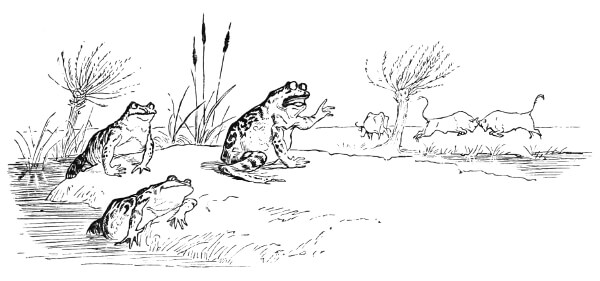A Fable for the Great Books

“The Fighting Bulls and the Frog” by Aesop
Two Bulls were fighting furiously in a field, at one side of which was a marsh. An old Frog living in the marsh, trembled as he watched the fierce battle.
“What are you afraid of?” asked a young Frog.
“Do you not see,” replied the old Frog, “that the Bull who is beaten, will be driven away from the good forage up there to the reeds of this marsh, and we shall all be trampled into the mud?”
It turned out as the Frog had said. The beaten Bull was driven to the marsh, where his great hoofs crushed the Frogs to death.
You can skip this next part if you want, for it is the “moral of the story” appended to the fable:
When the great fall out, the weak must suffer for it.
If you read the above moral, or deduced it for yourself, my re-write of the fable might be clearer. Allow me the chance to try my hand at it.
A great teacher was fighting against a great book in his classrom, in front of whom were his students. One student trembled as he watched the fierce battle.
“What are you afraid of?” asked another student.
“Do you not see,” replied the first student, “that the great book, once beaten, will become meaningless to and despised by us, and we shall be left defenseless without the wisdom it has to offer?”
It turned out as the first student had said. The beaten great book was forgotten, and the students grew up without its wisdom.
You can skip this next part if you want, my own moral to my own story:
When the great books are lost, the next generation will suffer.
Our own failure to recognize the importance of a great book, like the young frog’s failure to recognize the importance of the bull, is not permission to ignore it. A teacher ought not impose his own feelings about our cultural inheritance, passing on to his students, instead of a great inheritance, a disdain for the lovely and beautiful. For by doing so, the teacher fails to bestow wisdom and just judgment, even as he seems wise in his own eyes.
Dr. Matthew Bianco
Dr. Matthew Bianco is the Chief Operations Officer for the CiRCE Institute, where he also serves as a head mentor in the CiRCE apprenticeship program. A homeschooling father of three, he has graduated all three of his children, the eldest of whom graduated from St. John's College in Annapolis, MD. His second and third both graduated from Belmont Abbey College in Charlotte, NC. He is married to his altogether lovely high school sweetheart, Patricia. Dr. Matt Bianco has a PhD in Humanities from Faulkner University's Great Books Honors College and wrote his dissertation on Plato's Republic and education. He is the author of Letters to My Sons: A Humane Vision for Human Relationships.










